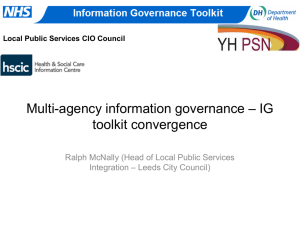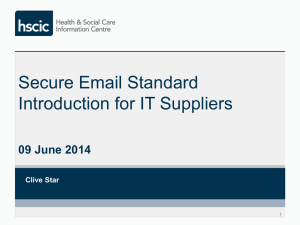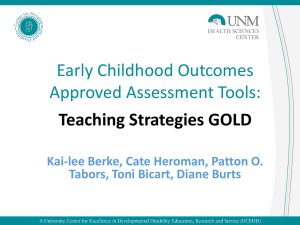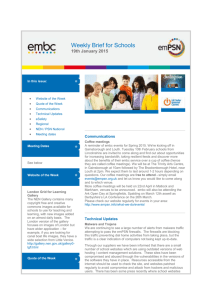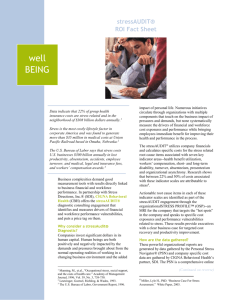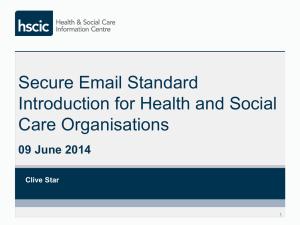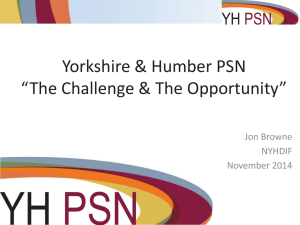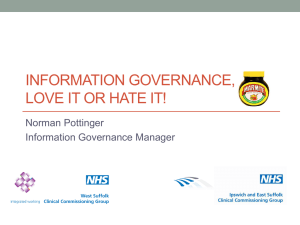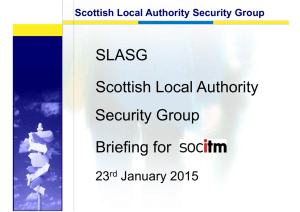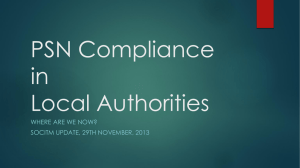here - Information Governance Toolkit
advertisement
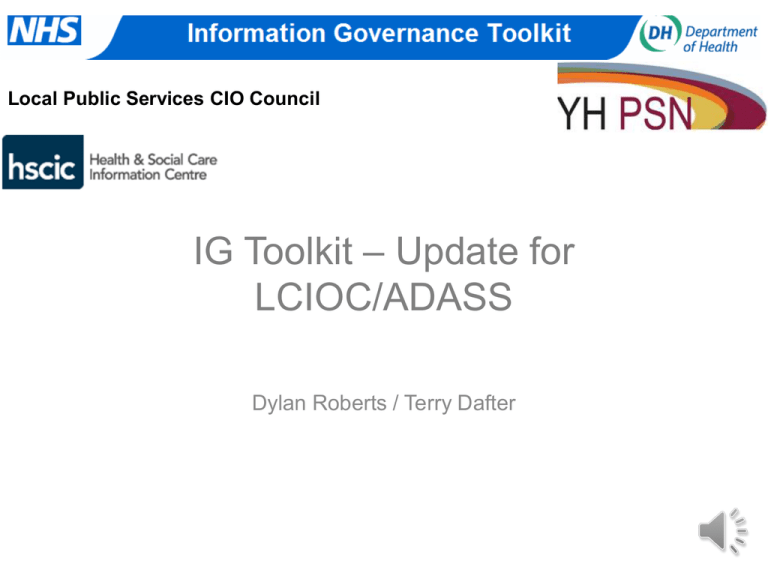
Local Public Services CIO Council IG Toolkit – Update for LCIOC/ADASS Dylan Roberts / Terry Dafter IGToolkit Project update – Session objectives 1. “What and Who” - What is happening and who is involved 2. “Why” - Explain the wider context and overlap … 3. “How” – Overview of the approach we are taking and latest progress 4. “When” and “Where Next” IGToolkit - Project Overview • Create the right environment to converge and coalesce IG/IA of both Health and Local Government. • Deliver this convergence in a sensible and pragmatic way • Deliver in phases. Phase one is focused on the “here and now”. – NHS IG Statement of Compliance – IG Toolkit (Social Care delivery). • Deliver a technical (infrastructure) solution for Health organisations as well as local authorities to use the Public Service Network (PSN). • Future phases are planned across government • The project has national support and from a wide range of stakeholders IGToolkit - Stakeholders • • • • • • The Association of Directors of Adult Social Services (ADASS) The Cabinet Office Department of Health NHS England Health and Social Care Information Centre (HSCIC) Local Chief Information Officers Council (LCIOC) • Actively supported with help and contributions from – The PSN Programme, – a wide range of local authorities groupings including the Association of Greater Manchester Authorities – The West Midlands IG Forum, Yorkshire and Humber equivalent – A watching brief from the ICO. A variety of drivers and other imperatives • Legislation and pending legislation (Health and Social Care Act 2012, The Care Bill) • Caldicott 2 Recommendations • Pioneer Projects (x14): Support for development of key building blocks for Integrated Health and Social Care programmes • Child Protection (Information Sharing project) • To support a raft of other local initiatives as well as national strategies requiring this approach…. • Need for a better way to support interoperability and service integration (people, place and process levels) • Combined challenges we face (austerity situation, rising demand for services, ageing population) “How” - Progress summary • Rewrite of the IGT Social Care Delivery view • A single corporate view rather than Adult Social Care service or Public Health perspective • Removes some of the confusion. – (some LA’s have completed the Hosted Secondary Use Team Project view previously but only for Public Health). • Subject to final sign-off but:– instead of LA’s being subject to completing 40 requirements the number has been reduced significantly and equivalence accepted (see separate slide deck) . • Fundamental Message - Give and Take approach by all parties District Councils • Some District Councils are now engaging with Health – Fitness Services to GPs – Co-location and premises sharing • Recognise Differences – No Caldicott Guardian – Already have PSN IA Certificate • Encouraged to look at the IG Toolkit – Simplifies requirements but… – Further work is ongoing to provide better fit. When and Where next • New local authority view (version 12) available mid to late June 2014 • Detailed guidance now being created • Commitment to making this an iterative and on-going process. • Open Door approach -Trust Embedded • Willingness to tackle the harder considerations moving forward • Technical project launched utilising Y+H PSN to provide an infrastructure solution • Business case created (alternative approach to N3 replacement) • Lobbying on-going to establish the funding stream – We cannot wait 3 years for a technical solution and final IG position The Advantages • Functional Improvements – Simpler to Use – One compliance not many – Reflects corporate rather than departmental responsibility • Strategic Advantages – Combination with PSN IA allows Local Authority to meet NHS IA/IG requirements now. – Allows use of PSN infrastructure rather than N3 – Prepares org for future changes in assurance – Allows for rapid developments in integration and colocation etc. – Allows for sharing of expertise, experience and resource • Tactical Advantages – Supports rapid adoption – Streamlines current internal processes – Avoids risks and costs of developing tactical solutions File classification: NOT PROTECTIVELY MARKED The Disadvantages of not adopting this approach • Jeopardises the advantages given • Increases costs and effort of compliance • May lead to use of N3 solutions which will be retired in 23 years • Reduced view may prevent true integration and joint working File classification: NOT PROTECTIVELY MARKED Where Next • A proposed single IG framework for government – beginning with local authority and the Health sector – based on legal basis for information exchange – Defined “top-ups” rather than compliance with a whole regime forced by one sector upon another. • Phase one – Identifying and working through the complex dependencies and timing issues • NHS Number Programme A Single Assurance Framework Sector Specific Requirements (eg. CCG) Sector Specific Requirements (eg. Adult Social Services) Health Requirements Sector Specific Requirements (eg. Housing) Local Authority Requirements Baseline Requirements (Converged PSN IA Conditions, IGSoC + IG Toolkit) The Proposals • HSCIC Working Group – Create a Project Team – Create Terms of Reference – Create a pro forma of new model • Baseline Requirements • Health and Local Authority Top Ups – Agree process for amendment (v1.1, 1.2 etc.) • By September 2014 – Develop V1.0 of a converged compliance by September 2014 – Agree communications plan – Agree implementation arrangements for 04/15 Stakeholder Engagement • National Informatics Board (10/06/14) – To be briefed by Linda Whalley - HSCIC – Support from Tim Donohoe -DoH • Office of the Govt. SIRO (20/05/14) – To be briefed by Mark Pope - PSN • PSAAB/IRAB – To be briefed by Mark Pope • LCIOC (22/05/14) – To be briefed by Dylan Roberts • ADASS – Terry Dafter Questions …. Should be directed to Ralph McNally ralph.mcnally@leeds.gcsx.gov.uk
